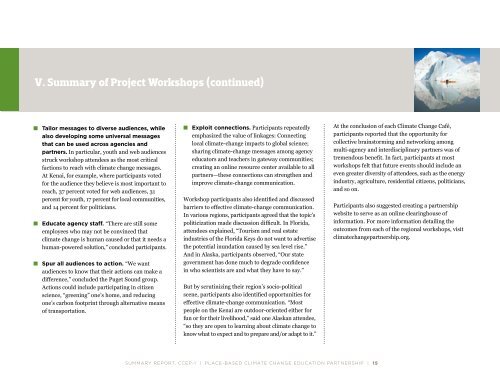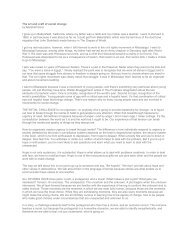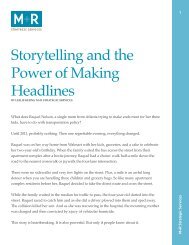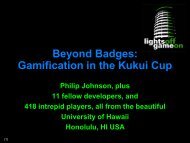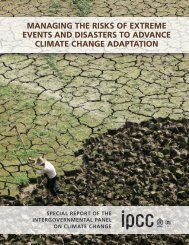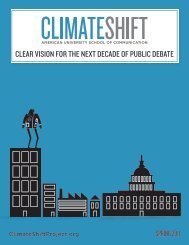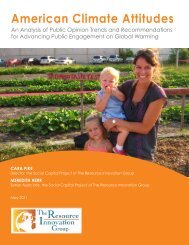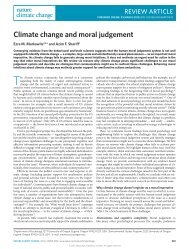Place-based Climate Change Education Partnership Report.pdf
Place-based Climate Change Education Partnership Report.pdf
Place-based Climate Change Education Partnership Report.pdf
Create successful ePaper yourself
Turn your PDF publications into a flip-book with our unique Google optimized e-Paper software.
V. Summary of Project Workshops (continued)<br />
<br />
<br />
<br />
In particular, youth and web audiences<br />
struck workshop attendees as the most critical<br />
factions to reach with climate change messages.<br />
At Kenai, for example, where participants voted<br />
for the audience they believe is most important to<br />
reach, 37 percent voted for web audiences, 31<br />
percent for youth, 17 percent for local communities,<br />
and 14 percent for politicians.<br />
“There are still some<br />
employees who may not be convinced that<br />
climate change is human caused or that it needs a<br />
human-powered solution,” concluded participants.<br />
“We want<br />
audiences to know that their actions can make a<br />
difference,” concluded the Puget Sound group.<br />
Actions could include participating in citizen<br />
science, “greening” one’s home, and reducing<br />
one’s carbon footprint through alternative means<br />
of transportation.<br />
Participants repeatedly<br />
emphasized the value of linkages: Connecting<br />
local climate-change impacts to global science;<br />
sharing climate-change messages among agency<br />
educators and teachers in gateway communities;<br />
creating an online resource center available to all<br />
partners—these connections can strengthen and<br />
improve climate-change communication.<br />
Workshop participants also identified and discussed<br />
barriers to effective climate-change communication.<br />
In various regions, participants agreed that the topic’s<br />
politicization made discussion difficult. In Florida,<br />
attendees explained, “Tourism and real estate<br />
industries of the Florida Keys do not want to advertise<br />
the potential inundation caused by sea level rise.”<br />
And in Alaska, participants observed, “Our state<br />
government has done much to degrade confidence<br />
in who scientists are and what they have to say.”<br />
But by scrutinizing their region’s socio-political<br />
scene, participants also identified opportunities for<br />
effective climate-change communication. “Most<br />
people on the Kenai are outdoor-oriented either for<br />
fun or for their livelihood,” said one Alaskan attendee,<br />
“so they are open to learning about climate change to<br />
know what to expect and to prepare and/or adapt to it.”<br />
At the conclusion of each <strong>Climate</strong> <strong>Change</strong> Café,<br />
participants reported that the opportunity for<br />
collective brainstorming and networking among<br />
multi-agency and interdisciplinary partners was of<br />
tremendous benefit. In fact, participants at most<br />
workshops felt that future events should include an<br />
even greater diversity of attendees, such as the energy<br />
industry, agriculture, residential citizens, politicians,<br />
and so on.<br />
Participants also suggested creating a partnership<br />
website to serve as an online clearinghouse of<br />
information. For more information detailing the<br />
outcomes from each of the regional workshops, visit<br />
climatechangepartnership.org.


